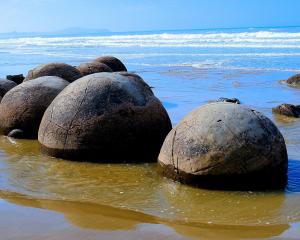Last week it was announced the Kurow Winery, which it is believed Mr Pasquale spent about $3 million building and equipping, and the surrounding 29ha of vines and bare land was for sale, with a deadline of 4pm on May 2 for offers.
Once it is sold, that will end Dr Pasquale and his family's association with the region, which started when he bought Caberfeigh Station in the Hakataramea Valley in 1999 and planted vines. He sold that last year.
He has found it increasingly difficult commuting from Russell to Kurow, where he likes to have a hands-on approach to all facets of his wine production.
Now Dr Pasquale is shifting the company's winemaking focus to Northland, where the family also retains farming interests.
''It is time for me to stop commuting to Kurow and to refocus on my home vineyard in Russell,'' he said.
Having won trophies, medals and praise with cool-climate wines produced from his Hakataramea and Waitaki Valleys vineyards, Dr Pasquale is now researching the techniques that produced the best wines in the world's warmer wine-growing regions.
Depending on a prospective buyer, the Kurow Village label could stay with the winery, but the premium Pasquale label will shift north and supplies remain available.
''The natural longevity of the Pasquale wines we have in bottle, barrel and tank means there will be sufficient stocks to meet demand over the next two or three years,'' he said.
''After that, it's quite likely the Pasquale label will be a smaller, smarter operation, helping to realise the potential of Northland's growing wine landscape. We will probably also continue the production of our Italian family specialties, such as limoncello and passito.''
Kurow Winery general manager Renzo Milo said three factors contributed to the decision to move the Pasquale brand away from Kurow - location, production cost and risk.
''Small wineries rely on having a good proportion of direct sales, and our location really is the middle of nowhere, with limited passing traffic, despite the development of an attractive cellar door and cafe [at Kurow].
''The cost of growing and hand-harvesting our low-yielding vines is reflected in the high quality and cost of the wine in bottle. Our pinot noir vines, for example, have only 20% of the yield found in Marlborough, and hand-harvesting is dramatically more expensive than using machines.
''The third factor is the risk, mostly from weather, that can wipe out a harvest every four or five years,'' he said.
Dr Pasquale said the transfer of the Pasquale wine-making away from the Kurow Winery may see the region revert from wine production to a purely grape-growing area, with its wines made elsewhere.
An alternative was for the various growers to buy the winery themselves.
The competition record of the wines produced across the Pasquale and Kurow Village brands - three trophies, 13 gold medals plus many silver medals - testified to the quality of the grapes and the winery.
Over the 14 years pioneering wine production in the region, Dr Pasquale poured energy and resources into planting more than 100,000 vines, creating employment, and, in 2009, building and equipping the valley's first and only winery.












